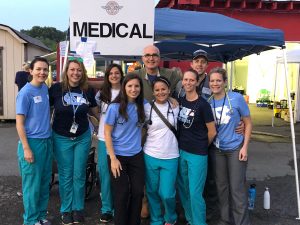Seven students and two faculty with the Physician Assistant Studies program returned to Wise, Virginia, in an effort to provide health care through Remote Area Medical (RAM), a nonprofit mobile medical clinic. RAM delivers dental, vision, and medical care to underserved and uninsured populations at no cost. This year, RAM provided care to more than 1,100 patients, including nearly $650,000 worth of services over the course of three days.

The PA program joined other health care practitioners and community partners to get hands-on experience across the health care spectrum. Meg Beal, an assistant professor in the PA program, said RAM provided an opportunity for PA students to implement what they’ve learned in the classroom.
“Watching students develop greater confidence and learning new skills, while in the throes of caring for patients, is such a joy to be a part of,” Beal said. “Service learning is invaluable in medical education, and the patients we served were so grateful.”
Kristen Brooks, a first-year PA student and native North Carolinian, said she chose to attend the RAM trip out of a desire to help others. “I love getting to know the patient, their background, all about their families, and building rapport with them. I want them to appreciate they are just as significant as any other patient,” Brooks said.
The RAM experience provides an opportunity for PA student to provide care for patients in a resource-limited setting, in which they must take medical histories, conduct medical exams, and work with faculty to determine appropriate treatment plans, among other tasks.
Paul Chelminski, professor of medicine and the PA program’s director, said student learn more than they initially perceive thanks to service-learning experiences like RAM.
“They, of course, learn about medicine by providing care to individuals,” Chelminski said. “They also learn about the remarkable resilience, resourcefulness, and solidarity of poor and underserved communities that rally to meet the needs of their citizens.”
“Our students are able to help in the process of referring patients to a specialist and then get to see immediately what the specialist recommends and how the patient’s care unfolds,” Beal said. “This real-time experience is something that would typically take place over the weeks to even months in a traditional medical system. Students get to work with volunteer providers from many different disciplines and gain a greater understanding of the value of interprofessional practice in medicine.”
Brooks said she is passionate about serving under-resourced communities, and it has solidified a desire to serve in rural areas once she graduates from the PA program.
“I realized how closely my goals and personal attributes align with what a PA was created to do,” Brooks said. “A PA is motivated to serve both their patients and the physicians whose services they help to extend,” Brooks said.
Beal said the RAM experience allows for teaching opportunities for students that cannot be replicated in the classroom or in a well-resourced medical environment.
“It truly feels like an experience where the heart of medicine is at the forefront,” Beal said. “Sharing that with our students is so meaningful.”
Paul Chelminski, MD, MPH, FACP, has served as PA program director since the program’s inception in fall 2015. Meg Beal, PA-C, serves as the PA program’s associate director of clinical education and spearheads rural and interprofessional initiatives.
